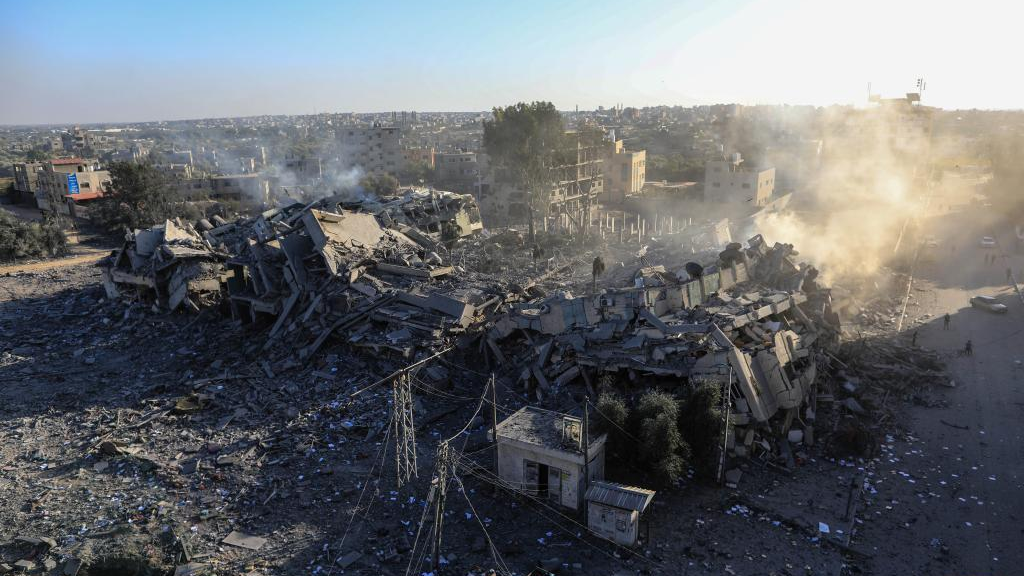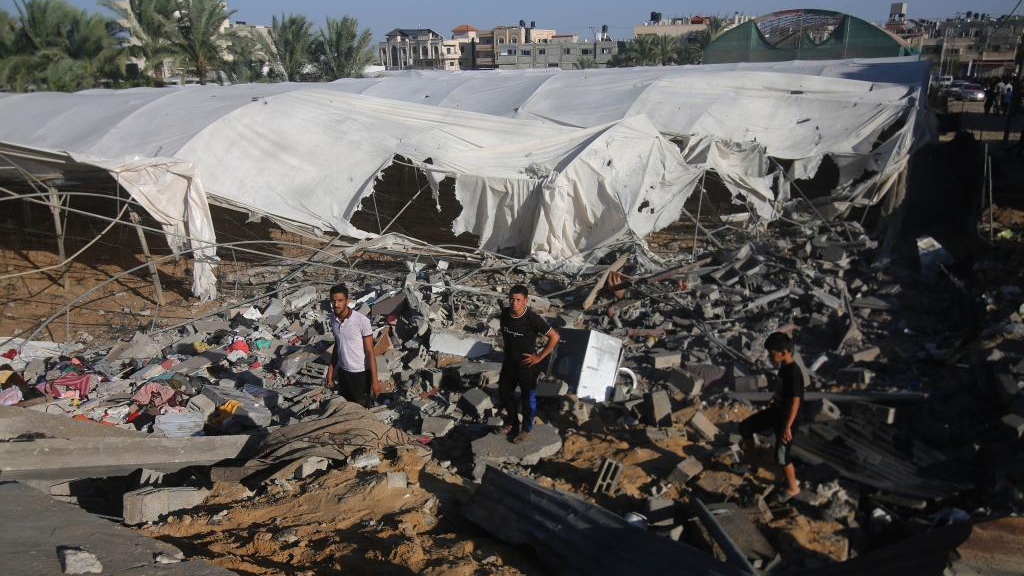
A building destroyed in Israeli airstrikes in the central Gaza Strip city of al-Zahra, October 20, 2023. /Xinhua
A building destroyed in Israeli airstrikes in the central Gaza Strip city of al-Zahra, October 20, 2023. /Xinhua
Editor's note: Zhang Chuchu, a special commentator for CGTN, is an associate professor of School of International Relations and Public Affairs and deputy director of Center for Middle Eastern Studies at Fudan University. The article reflects the author's opinions and not necessarily the views of CGTN.
As countless rockets continue to fly over Israel-Gaza border, and impoverished Gaza conditions worsen amid air strikes and a shortage of food, fuel and electricity, the deadly Israeli-Palestinian clashes have expanded.
The current crisis following the "Operation Al-Aqsa Flood" has flared up to an unprecedented level. For Israel, Hamas's operation on October 7 was surprising both in terms of its magnitude and tactics. For one thing, not only has the massive rocket barrage exhausted the overwhelmed Israel's billion-dollar Iron Dome system, but the influx of Hamas militants into the heavily fortified Israeli-controlled areas through land, sea, and air at daybreak came as a shock to Israel which has not experienced street battles on the land it has dominated since 1948.
For another, despite being a small force whose hardware is incomparable to the Israeli military, Hamas adopted asymmetric warfare tactics, breaking down the entire combat force and launching attacks in all directions, making it difficult for Israel to accurately locate the main force of Hamas. Through this flexible and low-cost guerrilla warfare, it seeks to increase the cost of, and reduce the efficiency of, its strong opponent's military reactions.
Yet, the Palestinian armed group's objectives may be more complicated if the ongoing tensions are placed in a broader context. Since the Obama administration, the foreign policy of the United States has centered around the so-called "strategic contraction" from the Middle East, meaning to restrain from pouring force, funding, and resources in the region. Under this guideline, Obama and his two successors have ended so called war on terror, adjusted resource allocation, and significantly rebalanced their efforts toward the "Indo-Asia-Pacific" region.
The risk, however, of this strategy is that the American commercial interests and personnel security may be threatened if Washington's disengagement leads to a deterioration of the security conditions in what it perceived as the "Middle Eastern Quagmire."
In order to shift away from the region without causing significant losses for itself, the White House has actively promoted the Middle East reconciliation by bypassing the thorny Palestine-Israel disputes, and facilitating peace talks between Israel and Arab states under the Abraham Accords. To date, the UAE, Bahrain, Morocco and Sudan have already signed normalization agreements with Israel.

People stand among the rubble of a building destroyed in Israeli airstrikes in the southern Gaza Strip city of Rafah, October 20, 2023. /Xinhua
People stand among the rubble of a building destroyed in Israeli airstrikes in the southern Gaza Strip city of Rafah, October 20, 2023. /Xinhua
There are sources suggesting that as a follow-up step, the White House has recently been pushing hard for Saudi Arabia to make its own peace agreement with Israel. This is of great concern to various Palestinian political actors, not just Hamas, as the Arab-Israeli normalization will reduce pressure on Israel to reach a settlement with Palestinians.
The escalating Palestinian-Israeli conflicts indicate that it is not realistic to discuss the Middle Eastern reconciliation if the Palestinian issue is not settled. Along with the rise of Arab nationalist sentiments and a growing debate over the narratives of the Palestinian cause in the Arab world, the Saudis' efforts to normalize ties with Israel are now, at least temporarily, in limbo.
In the short term, the right-wing Israeli government, formed under the leadership of Benjamin Netanyahu, has strong motivation to craft drastic military responses towards the Gaza Strip. Retaliatory bombardment not only helps alleviate Netanyahu's governance crisis caused by his controversial judicial reform, but can also distract Israeli public opinion from the failure of its security services to stop Hamas.
Meanwhile, an increasing number of non-state armed actors' joining the battle further deepens fears of a deadly escalation in violence, as shown in Lebanese Hezbollah's launch of rockets to destroy Israeli military targets along the Lebanese border, as well as a spate of new attacks on American military bases in Iraq.
In the long run, it is worth noting that neither Israel, which is facing an economic fallout, nor Hamas, which is currently under siege, may be able to withstand a sustained tug-of-war. Moreover, a conflict that spirals out of control is far from being a preferred option for U.S. President Joe Biden, who is running for re-election and is determined to reduce Washington's commitment to the Middle East.
Perhaps as attempts to de-escalate the tensions, Biden assembled a rarely-seen concentration of naval power in the Easter Mediterranean Sea to deter Arab countries from attacking Israel on multiple fronts on the one hand, and warned Israel to avoid repeating mistakes made by Washington after 9/11 and narrow down its military strike targets on the other hand.
However, past empirical evidence shows that whatever the outcomes of the ongoing armed conflicts, further violence won't be prevented if fundamental solutions are not implemented to deal with the Palestinian issue. Even if there is an eventual ceasefire between the two sides in the conflict, the shadow of the Israeli-Palestinian confrontation may still linger.
(If you want to contribute and have specific expertise, please contact us at opinions@cgtn.com. Follow @thouse_opinions on Twitter to discover the latest commentaries in the CGTN Opinion Section.)